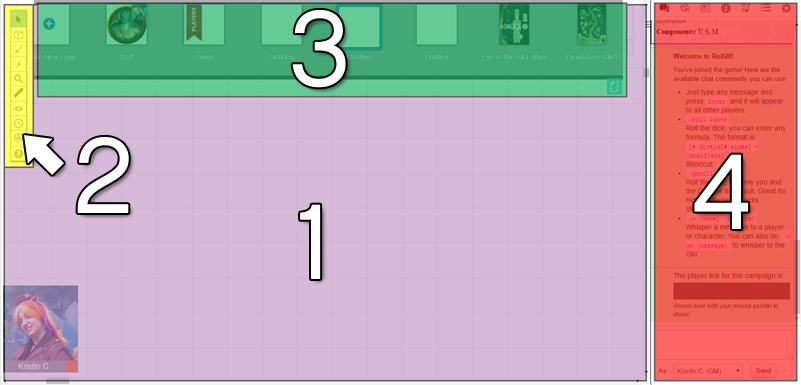Difference between revisions of "Tabletop Overview"
From Roll20 Wiki
Andreas J. (Talk | contribs) m |
Andreas J. (Talk | contribs) m (→Art Search) |
||
| Line 39: | Line 39: | ||
====Art Search==== | ====Art Search==== | ||
| − | + | {{#evp:youtube|DkIhdFWh04A|Moving around the map|right|500}} | |
This method is accomplished by going to the '''Art Library''' tab in the '''[[Sidebar]]''' and running a search for a desired art element. When you find an image that you wish to use, click the thumbnail from the search and drag it onto The Tabletop. | This method is accomplished by going to the '''Art Library''' tab in the '''[[Sidebar]]''' and running a search for a desired art element. When you find an image that you wish to use, click the thumbnail from the search and drag it onto The Tabletop. | ||
Revision as of 18:41, 4 April 2021
Attention: Roll20 is no longer maintaining this document on the community wiki. For the most up-to-date information please visit this page on our help center for assistance: Here.
This is the playspace that represents the actual "table" of your game. It's where you can act out RPG combat with minis on a battlemap, deal a hand of cards and throw around some poker chips, move mooks around a gameboard, or just display backdrop pictures to set the right mood.
The Tabletop
- Interface
- 1. The Tabletop
- 2. The Toolbox
- 3. Page Toolbar
- 4. The Sidebar
Contents |
Elements of The Tabletop
There's two image element types that display on The Tabletop: Background Images and Tokens.
- Background Images are any graphics that you don't plan to move or interact with while playing your game. This would be images like the game board of a boardgame or the terrain of a battlemap. You will want to keep these images on the @ Map & Background Layer.
- Tokens are any image that you plan to move around the Table. This would include images like RPG minis, board game components (treasure chests, meeples, etc), poker chips, vehicles etcetera. An image that is to be treated as a Token must be placed on either the bObjects & Tokens or E GM Overlay Info Layer.
Placing Images onto The Tabletop
Roll20 currently accepts the following image file types: .jpg, .png, and .gif. Files with transparent elements will maintain their transparency on the Roll20 Tabletop.
Keep in mind that currently .jpeg is not a supported file type. If you are having difficulty uploading a .jpeg you can easily change it to .jpg via most image editing programs.
Image Insertion Methods
Main Article: P Art Library
There are two ways to place images onto The Tabletop: direct upload or an image search.
Direct Upload
To use images from your own personal files, click on an image from your computer files and drag it directly onto The Tabletop. This will initiate an upload of that image to Your Art Library. When the upload is complete, it'll display the image on The Tabletop.
If you would prefer to batch upload a series of images at once, you can do this from the P Your Art Library window that you can access from the Sidebar's Art Library-tab. There is a 10 files/5 MB file size per batch limitation to batch uploads.
Art Search
This method is accomplished by going to the Art Library tab in the Sidebar and running a search for a desired art element. When you find an image that you wish to use, click the thumbnail from the search and drag it onto The Tabletop.
Moving Around The Tabletop
You can pan around your Page by either using the scroll bars to the right and bottom of the Tabletop OR click and drag with the right mouse button.
You can zoom either by using the s Zoom Tool from the Toolbox OR hold down alt/option while scrolling with the mouse wheel.
Pinging the Map
If you click and hold down anywhere on the map, radar rings sprout out from the point of your mouse cursor. These Pings are visible to everyone currently playing the Game. The GM / Players' current user color is applied to each Ping to better identify who's indicating what. This tool can help indicate points of interests on a map
Shift+Ping (GM Feature)
A GM can force all their players to view a certain area of the map by holding the Shift key while Pinging. This is very helpful if you have a very large dungeon map to explore. When a new Page is loaded, the Tabletop's view is automatically set to the upper left hand corner of the Page. If you have the Fog of War enabled, your players might be greeted with their entire Tabletop filled with black fog. Instead of the players panning around the Page to locate their tokens, a Shift Ping leads your players right where they need to be.
Related Pages
- Token Features
- Manipulating Graphics
- Aligning Maps with Existing Grids
- Game Management
- Gamemaster
- Player










